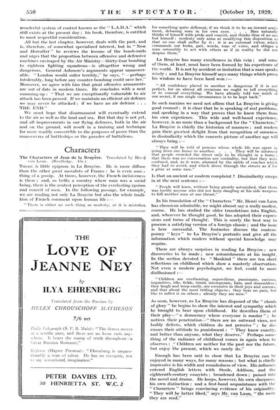Characters
The Characters of Jean de la Bruyere. Translated by Her --van Laun. (Routledge. - 15s.) - THIIIE is little epigram in La Bruyere. He is more diffuse than the other great moralists of France ; he is even some- thing of a gossip. At times, however, the French incisiveness is there ; and, as befits a country where man was a social being, there is the acutest perception of the everlasting egoism and conceit of men. In the following passage, for example, we are reading not only La Bruyere but also the whole tradi- tion of French comment upon human life :— " There is either no such thing as modety, or it is mistaken for something-quite different; if we think it to be an inward senti- ment, debasing man in his own eyes. . . . Man naturally thinks of himself with pride and conceit, and thinks thus of no one but himself ; modesty only aims at modifying this disposition so that no one shall suffer by it ; it is an external virtue, which commands our looks, gait, words, tone of voice, and obliges a man ostensibly to act with others as if in reality he did not despise them."
La Bruyere has many excellences in this vein ; and some of them, at least, must have been formed by his experience of the world. It is not by accident or imitation that a man speaks wisely ; and La Bruyere himself says many things which prove his wisdom to have been hard won :- " All confidence placed in another is dangerous if it is not perfect, for on almost all occasions we ought to tell everything or to conceal everything. We have already told too much of our secret, if one single circumstance is to be kept back."
In such maxims we need not affirm that La Bruyere is giving good counsel : it is clear that he is speaking of real problems, and speaking in a way that proves that he knew them from his own experience. This wide and well-based experience, however, is no more than a background for the " Characters." La Bruyere is chiefly the historian of manners ; and readers gain their greatest delight from that recognition of sameness in dissimilarity which the concrete picture of another age will always bring :— " They will be told of persons whose whole life was spent in going from one house to another. . . . They will be informed that people crowded the street only to be thought in a hurry ; that there was no conversation nor cordiality, but that they were confused, and, as it were, alarmed by the rattle of coaches which they had to avoid, and which drove through the streets as if for a prize at some race."
Is that an ancient or modern complaint ? Dissimilarity creeps in at the next sentence :—
" People will learn, without being greatly astonished, that there was hardly anyone who did not keep dangling at his side weapons to kill another man at one thrust."
In his translation of the " Characters " Mr. Henri van Laun has chosen an admirable, we might almost say a really modest, course. He has studied the older translations into English, and, wherever he thought good, he has adopted their expres- sions and turns of thought. This is surely the best. way to procure a satisfying version of a foreign classic ; and the issue is here successful. The footnotes discuss the contem- porary " keys " to La Bruyere's portraits and give all the information which readers without special knowledge may require.
There are always surprises in reading La Bruyere ; new discoveries to be made ; new astonishments at his insight, In the section devoted to " Mankind " there are ten short reflections on childhood which show a masterly observation. Not even a modern psychologist, we feel, could be more disillusioned :-
"Children are overbearing, supercilious, passionate, envious, inquisitive, idle, fickle, timid, intemperate, liars, and dissemblers; they laugh and weep easily, are excessive in their joys and sorrows, and that about the most trifling objects ; they bear no pain, but like to inflict it on others ; already they are men."
As soon, however, as La Bruyere has disposed of the " clouds of glory " he begins. to show the interest and sympathy which he brought to bear upon childhood. He describes them at their play" a democracy where everyone is master " ; he notices their penetration—" there are no outward vices, nor bodily defects, which children do not perceive " ; he dis- cusses their attitude to punishment : " They know exactly, and better than anyone, what they deserve." Perhaps some- thing of the radiance of childhood comes in again when he observes : ," Children are neither for the past nor the future, but enjoy the present, which we rarely do."
Enough has been said to show that La Bruyere can be enjoyed in many ways, for many reasons ; but what is chiefly impressive is his width and roundedness of view. His influence entered English letters with Steele, Addison, and the eighteenth-century essayists ; broadened down; paksed into the novel and drama. He keeps, however, his own sharpness, his own distinction ; and a first-hand acquaintance With the " Characters " brings convincing evidence of his originality. " They will be better liked," says Mr. van Latin, " the more they are read.






















































 Previous page
Previous page